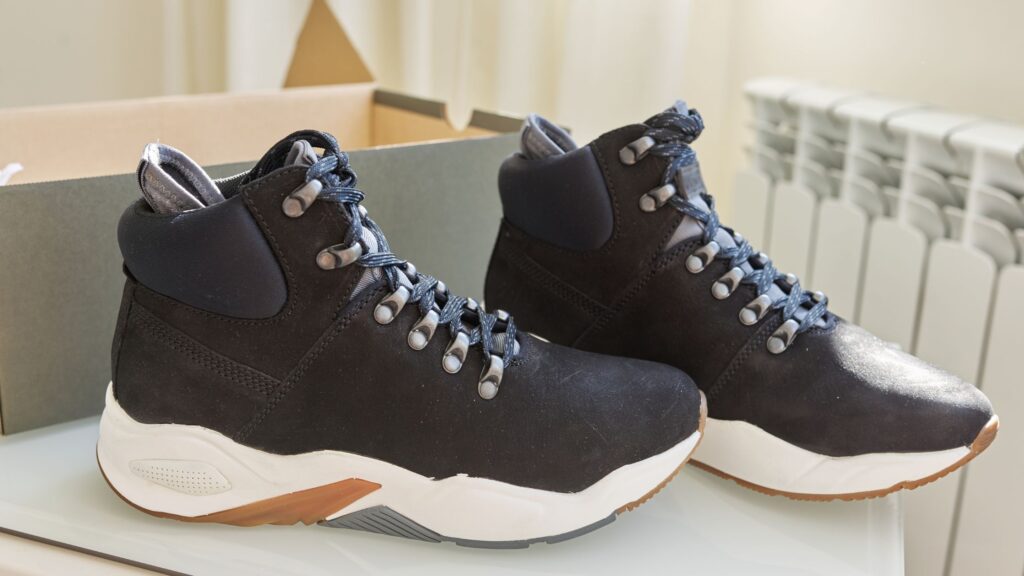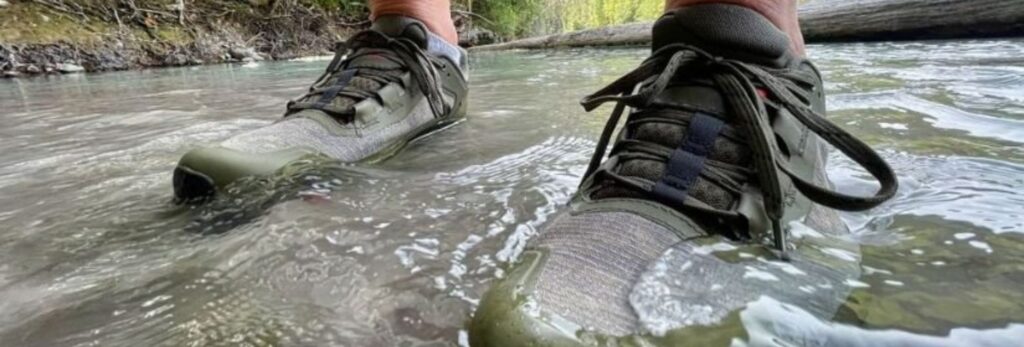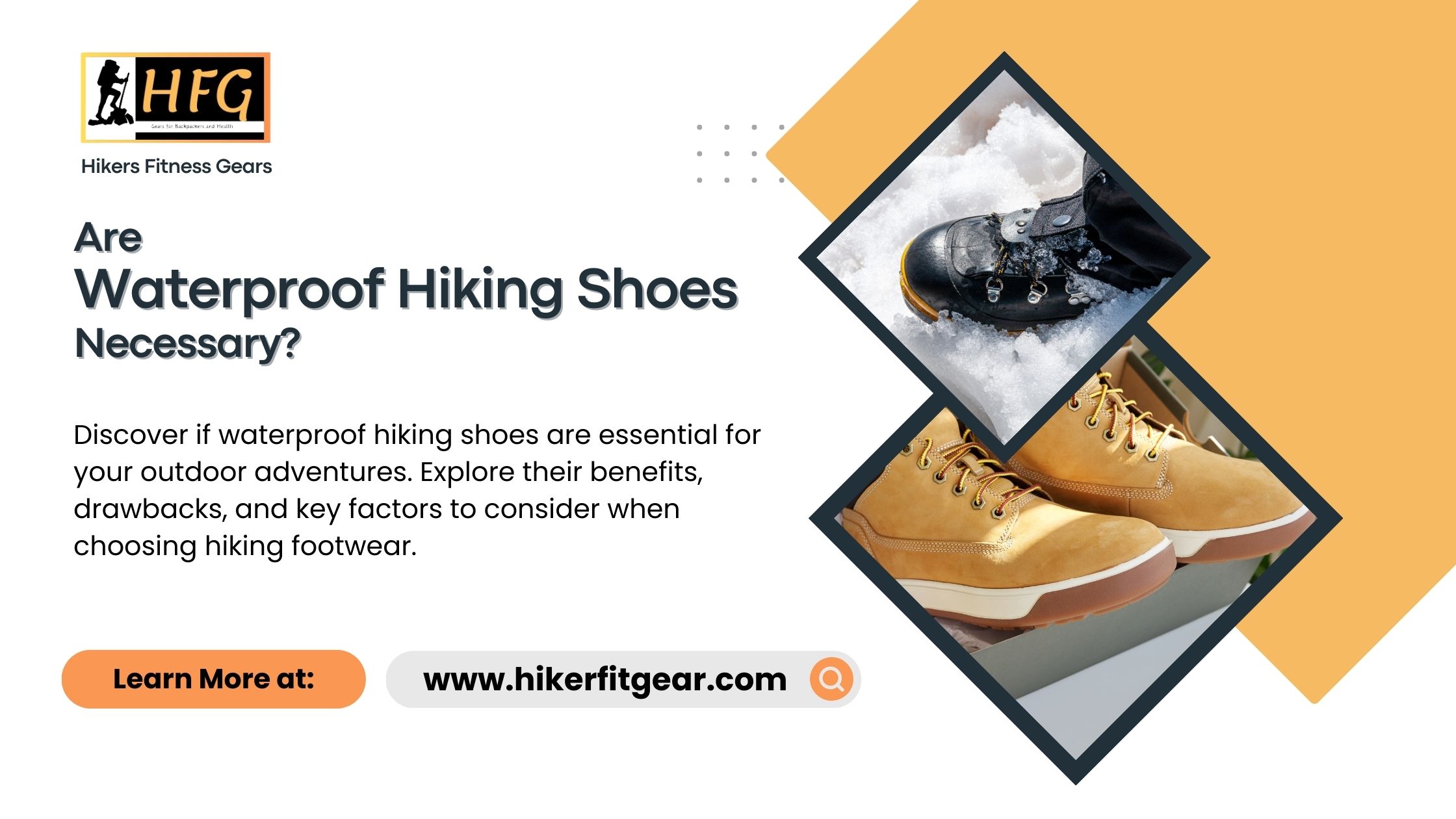Are Waterproof Hiking Shoes Necessary?
Introduction
When preparing for a hiking adventure, selecting the appropriate footwear is paramount. Among the considerations that hikers often deliberate is whether hiking shoes are indispensable. This comprehensive guide aims to delve into the nuances of waterproof shoes, delineating their advantages and disadvantages, and helping hikers make informed decisions based on their specific needs and hiking conditions.
Table of Contents
What This Post Covers
This in-depth exploration of waterproof hiking shoes will encompass:
- A detailed definition and explanation of waterproof hiking shoes.
- An analysis of the benefits and drawbacks of utilizing waterproof hiking shoes.
- Essential factors to contemplate when choosing hiking footwear.
- A comparative analysis between waterproof and non-waterproof hiking shoes.
- Practical recommendations and tips for selecting the most suitable hiking shoes for diverse terrains and weather conditions.
What are Waterproof Hiking Shoes?
Definition and Features
Waterproof shoes are meticulously crafted footwear designed to thwart water infiltration. These hiking shoes are equipped with specialized materials, such as Gore-Tex membranes, that act as barriers against moisture while facilitating breathability. Their construction typically includes robust soles for enhanced traction, padded interiors for comfort, and durable outer layers to withstand rugged terrains.

Types of Waterproof Hiking Shoes
- Full Waterproof Boots: These boots offer complete protection against water and are ideal for traversing extremely wet or cold environments.
- Water-Resistant Shoes: While not entirely impervious to water, these shoes provide a degree of protection and are lighter and more breathable than fully waterproof models.
Why Are Waterproof Shoes Important?
Ensuring Dryness and Comfort
The primary advantage of shoes is their ability to keep feet dry, even in inclement weather conditions. Wet feet can lead to discomfort, blisters, and potential health hazards, making waterproof shoes invaluable for maintaining hiking enjoyment and safety.
Enhanced Safety and Performance
By preventing water ingress and offering superior traction on slippery surfaces, waterproof shoes contribute significantly to hiker safety. The improved grip minimizes the risk of slips and falls, especially during challenging hikes with uneven or wet terrain.
Versatility and Durability
hiking shoes are versatile companions that enable hikers to tackle a spectrum of environments, from rain-soaked trails to snow-covered mountains. Their durable construction ensures longevity, making them reliable partners for numerous hiking expeditions.
How Are Waterproof Hiking Shoes Necessary?
The main body of the topic delves deeply into the benefits and drawbacks of waterproof hiking shoes, discussing their role in keeping feet dry, enhancing safety and performance, and offering durability and versatility. It explores different types of waterproof hiking shoes, compares them to non-waterproof alternatives, and provides practical tips for choosing the best footwear based on fit, breathability, weight, and traction. The section emphasizes the importance of understanding the unique features of waterproof hiking shoes and how they impact the hiking experience in various environments and weather conditions.
Protection Against Elements
Waterproof shoes shield feet from moisture, mud, and snow, maintaining dryness and comfort throughout the hike.
Versatility and Adaptability
These shoes excel in diverse weather conditions, allowing hikers to explore different terrains without compromising performance or safety.
Durability and Longevity
Constructed from high-quality materials, waterproof shoes withstand rugged terrains and prolonged use, providing enduring support and protection.
Drawbacks of Waterproof Hiking Shoes
Reduced Breathability
The waterproofing technology in these shoes can limit breathability, potentially causing feet to sweat more, especially in warm weather conditions.
Increased Weight
Compared to non-waterproof alternatives, waterproof shoes may be slightly heavier, which could impact hiker endurance during extended hikes.
Higher Cost
The advanced materials and technologies used in waterproof shoes often result in higher price points, requiring a greater investment from hikers.
Why are Hiking Shoes Different from Other Similar Shoes?
Specialized Design and Construction
Unlike standard hiking shoes, waterproof shoes incorporate specific features and materials tailored for moisture protection, setting them apart in terms of functionality and performance.
Application Across Varied Environments
While regular hiking shoes offer general-purpose functionality, waterproof shoes are engineered for versatility, allowing hikers to traverse wet, snowy, or muddy terrains with confidence.
Things to Look for When Dealing with Hiking Shoes
Fit and Comfort
Prioritize shoes that provide a snug yet comfortable fit, as ill-fitting footwear can lead to discomfort and blisters, detracting from the hiking experience.
Breathability and Ventilation
opt for models that strike a balance between waterproofing and breathability, ensuring adequate airflow to prevent excessive sweating and moisture buildup.
Weight and Flexibility
Consider the weight of the shoes, especially for long-distance hikes where lighter footwear can enhance agility and reduce fatigue. Additionally, flexible shoes conform to varied terrains more effectively.
Traction and Stability
Evaluate the sole design for optimal traction and stability, particularly on slippery or uneven surfaces commonly encountered during hikes.

Conclusion
These shoes offer invaluable benefits in terms of moisture protection, comfort, and safety, making them essential companions for hikers exploring wet or challenging terrains. However, hikers should carefully weigh these advantages against potential drawbacks such as reduced breathability and increased weight. Ultimately, the necessity of waterproof shoes hinges on the specific hiking conditions and personal preferences of each hiker.
Frequently Asked Questions:
How Can I Ensure the Longevity of Waterproof Hiking Shoes?
Regular maintenance, including cleaning and applying waterproofing treatments, can extend the lifespan and effectiveness of shoes.
Are Waterproof Hiking Shoes Suitable for All Hiking Environments?
While waterproof hiking shoes excel in wet or snowy conditions, they may not be necessary for dry or warm environments where breathability and lightweight footwear are prioritized.
Can I Use Waterproof Hiking Shoes for Casual Walking or Urban Exploration?
While designed for hiking, waterproof shoes can be used for casual walking or urban exploration, providing durability and protection against unexpected weather changes.
Are There Waterproof Hiking Shoes Specifically Designed for Different Foot Shapes?
Yes, many brands offer waterproof hiking shoes in various widths and sizes to accommodate different foot shapes and provide a comfortable fit for all hikers.
Do Waterproof Hiking Shoes Offer Insulation in Cold Weather?
Some waterproof hiking shoes are insulated to provide warmth in cold climates, but hikers should check the specifications of each shoe to ensure they meet their insulation requirements.

My name is Oje and I’m obsessed with finding the latest tech gear to help people track progress and solve problems more efficiently. I spend countless hours researching and testing innovative apps, wearables, and devices for fitness, health, productivity, and more.
